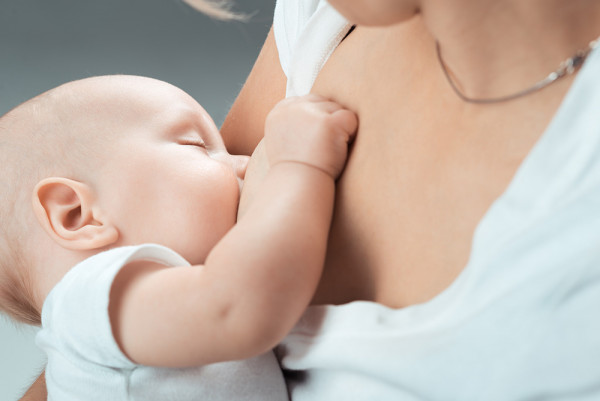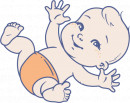
Nutrition from 0 to 6 months
Discovering the world
Nature is well designed: your breast milk fully covers your baby’s needs. When you breastfeed, you are sure to give your baby what is best for her, month after month.

Breastfeeding
Benefits:
- The composition of breast milk changes with your baby’s age, providing the exact range of nutrients she requires.
- Breast milk is perfectly adapted to your baby’s delicate body and immature digestive system.
- Your milk will provide the antibodies she needs to strengthen her immune system.
A very special bond
- Breastfeeding offers total skin-to-skin contact with your baby. Because babies find their bearings through touch and smell, she will be reassured to feel and smell you. Contact establishes mutual trust.
- Your first attempts are important. In these first hours of life, your baby’s suckling instinct is at its strongest: trust that she knows how to breastfeed. Ideally, you will start immediately after birth to promote milk flow. If this feels like it’s too soon, you can try again when you are snuggled quietly in your room.
- Find the right position. Your nipples may be a bit sensitive before you get used to breastfeeding. The new sensation can be surprising. If the first seconds of feeding are painful, try slipping your finger into your baby’s mouth to find a more comfortable position. Don’t hesitate to ask a midwife for advice on how your baby can latch on without hurting you.
- Sit comfortably in a peaceful, ventilated place that isn’t too warm. Your baby should not be distracted by surrounding activity. Rather than holding her, use cushions to prop her body up. She should rest against you or on the bed, facing your breast, her head tilted slightly back for unhindered swallowing.
- Breastfeed on demand, without worrying about the number or length of feeds, especially during the first few days. She will settle into a rhythm and will feed 8 to 12 times a day on average. Feeds may range from 10 minutes for quicker babies to forty-five minutes for slower ones.
Your baby will feed depending on her appetite and your breasts will produce milk according to her needs. Leave her on the breast as long as she is suckling effectively. - You may use a breast pump for busy times. However, bear in mind that milk will not keep for more than 48 hours in the fridge, at 4° C maximum. If you want to freeze your milk for a longer period, don’t defrost it in the microwave, which will damage its anti-infection agents.
Baby’s progress

Your baby suckles and pushes the breast away with her tongue when she is done.

She listens, babbles, smiles.

She holds her head up, starts picking up objects within her reach, taps, explores their mouth.

She picks things up, recognises faces, sits up with support, sucks on toys.
Her first teeth come in.

Breastfeeding and nutrition
Eat a balanced diet, keeping in mind that your needs will be a bit higher than usual, but lower than during pregnancy. For example, you may wish to keep on snacking.
In fact, this is not the time to start shedding the extra weight you gained during pregnancy. You would risk depriving your child of essential nutrients.
Leave out:
Alcohol and tobacco, as well as soya and soya-based foods, which contain phytoestrogens. These substances act like oestrogen and have an effect on hormonal balance.
Avoid:
Foods that have a strong smell which tend to give milk a flavour. Some babies are more sensitive to this than others. Eating a varied diet during breastfeeding is a good way of introducing your baby to tastes that she will rediscover when you start introducing solids.
Emphasise:
- Dairy products (milk, yoghurt, cottage cheese) to make sure that you are getting enough calcium.
- Meat, fish, and eggs, for their high protein and iron content to compensate for any depleted nutrients from childbirth.
- Fruit and vegetables for their high fibre, mineral, and vitamin content.
- Grains (rice, semolina, pasta), pulses (beans, lentils, etc.), and potatoes, as they provide carbohydrates, minerals, vitamins, and fibre.
- Fats: focus on rapeseed and walnut oils or on oil blends which provide essential fatty acids.
- Water: drink lots of it. Because milk is essentially made up of water, you will need to hydrate more when breastfeeding.
Our answers to your questions
-
Babies know how to regulate their appetite and feel when they no longer need to eat. Once they are full, babies will naturally stop feeding.
-
Pregnancy is what transforms your breasts, not breastfeeding. Wear a special bra for as long as you are breastfeeding for adequate support and easy access to your breasts.
-
Once you get used to breastfeeding, it will be no trouble at all to do so discretely.
Wear loose clothing or wrap yourself in a shawl. -
Your doctor or chemist will be able to tell you if your medicine is compatible with breastfeeding or not. This will also depend on your baby’s age and weight. You should generally avoid self-medicating.
-
Engorgement happens when mammary glands produce too much milk, which tends to happen when your baby is not feeding frequently enough. Your breast will become swollen, red, and painful. The nipple will flatten out, making it hard for your baby to latch on. For relief, encourage the flow of milk by feeding your child, by expressing it manually, or using a breast pump.
-
When your baby is 3 months old, she can take a bottle when you are at work and be breastfed when you are home. Let-down may be a bit tricky, though.
You can continue breastfeeding by using a manual or an electric pump to express milk for bottles when you are away. But follow strict hygiene rules to store your milk: sterilise all equipment and keep your milk in the coldest part of your fridge, at 4° C (not in the door).Your doctor or your child’s paediatrician will advise you and help you navigate this important milestone.